人教版英语九年级unit2知识点教学教材
- 格式:docx
- 大小:19.88 KB
- 文档页数:7

人教版英语九年级Unit 2《I think mooncakes are delicious》说课稿 (2)一. 教材分析人教版英语九年级Unit 2《I think mooncakes are delicious》主要介绍中秋节的食物和习俗。
本节课的主要内容是学习与中秋节相关的词汇和表达方式,以及通过讨论来培养学生的听说能力和交际能力。
教材通过介绍中秋节的传统美食——月饼,引导学生了解中国的传统文化,激发学生对学习英语的兴趣。
二. 学情分析九年级的学生已经具备了一定的英语基础,能够听懂并运用一些基本的英语句型进行交流。
但是,对于一些关于中秋节的专业词汇和表达方式,他们可能还没有接触过。
因此,在教学过程中,需要帮助学生建立起新旧知识之间的联系,引导学生运用已有的英语知识去理解和表达新的信息。
三. 说教学目标1.知识目标:学生能够听懂、说出一系列与中秋节相关的词汇和表达方式,如mooncake, dragon boat racing, lantern, Mid-Autumn Festival等。
2.能力目标:学生能够用英语描述中秋节的食物和习俗,并能够就相关话题进行简单的交流。
3.情感目标:通过学习本节课的内容,学生能够了解中国的传统文化,增强对国家节日的认识和尊重。
四. 说教学重难点1.重点:中秋节相关词汇和表达方式的掌握,以及运用这些词汇进行简单的交流。
2.难点:对一些关于中秋节的专业词汇和表达方式的理解和运用,如“月圆人圆”、“赏月”等。
五. 说教学方法与手段本节课采用任务型教学法,通过设定各种真实情境,引导学生进行听力、口语、阅读和写作的实践活动。
同时,运用多媒体教学手段,如图片、视频等,帮助学生更好地理解和掌握知识。
六. 说教学过程1.导入:通过展示中秋节的相关图片,引导学生谈论自己对这个节日的了解和感受,激发学生的学习兴趣。
2.新课呈现:教师通过讲解和示范,介绍中秋节的相关词汇和表达方式,让学生进行听力练习。

人教版九年级英语U n i t2A知识点(总9页)-CAL-FENGHAI.-(YICAI)-Company One1-CAL-本页仅作为文档封面,使用请直接删除Unit 2 I think that mooncakes are delicious!Section A1. But I guess it was a little too crowded.但我认为它有点儿太拥挤了。
(教材第9页)crowded形容词,意为“拥挤的”。
常构成短语be crowded with…意为“被……挤满”。
The shop near my home is always crowded with people.我家附近的那家商店总是挤满了人。
拓展:crowd作动词,意为“拥挤,群集”。
Hundreds of people crowded into the church.数百人拥进了教堂。
2. Bill thinks that the races were not that interesting to watch.比尔认为那些比赛观看起来并不那么有趣。
(教材第9页)were not that interesting to watch意为“观看起来并不那么有趣”,其中that此处用作副词,强调程度,意为“那么,如此”。
No one expected it to cost that much.没有人想到会花那么多钱。
3. Bill wonders whether they’ll have zongzi again next year.比尔想知道明年他们是否将再有粽子(教材第9页)⑴wonder此处用作及物动词,意为“想知道”,相当于want to know。
wonder在不同的句式中表达的意思也不同:①后接who,what,why等连接词引导的宾语从句及“疑问词+动词不定式”结构时,意为“想知道”。
I wonder who that boy is.我想知道那个男孩是谁。

人教版九年级英语unit2知识点总结人教版九年级英语unit2知识点总结单词Mooncake ['mu:nke?k] n. 月饼lantern [?l?nt? (r)n] n. 灯笼stranger [?streind?? (r)] n. 陌生人relative [?rel?tiv] n. 亲属;亲戚put on 增加(体重);发胖pound [paund] n. 磅(重量单位);英镑folk [f?uk] adj. 民间的;民俗的goddess [?g?des][?ɡɑd?s] n. 女神whoever [hu:?ev? pron.无论是谁;不管谁;任何人steal [sti:l] v. (stole [st?ul], stolen [st?ul?n]) 偷;窃取lay [lei] v. (laid [leid], laid) 放置;产(卵)lay out 摆开;布置dessert [di?z?:(r)t] n.( 饭后)甜点;甜食garden [ga:(r)dn] n. 花园;园子 tradition [tr??d??n] n.传统admire [?d?mai? (r)] v. 欣赏;仰慕tie [tai] n. 领带 v. 捆;束haunted [?h?:ntid] adj.有鬼魂出没的 ghost [g?ust] n. 鬼;鬼魂trick [trik] n. 花招;把戏treat [tri:t] n. 款待;招待;请客spider [?spaid?r)] n. 蜘蛛Christmas [?krism?s] n. 圣诞节lie [laI] v. (lay [leI],lain [leIn]) 存在;平躺;处于novel [?n?vl] [?na:vl] n.(长篇)小说eve [i:v] n.(尤指宗教节假日的)前夕;前夜dead [ded] adj.死的;失去生命的business [?bizn?s] n. 生意;商业punish [?p?nis] v. 处罚;惩罚 warn [w?:(r)n] v. 警告;告诫end up 最终成为;最后处于present [preznt] n. 现在;礼物 adj. 现在的nobody [n?ub?di] [n?uba:di] pron. 没有人warmth [w?:(r)mθ] n. 温暖;暖和spread [spred] v. 传播;展开 n. 蔓延;传播Macao [m??kau] 澳门Chiang Mai [?t?i?n?maI], [d?a:nmaI] 清迈(泰城市)Water Festiwal 泼水节Mid-Autumn中秋节Mother's Day母亲节Father's Day 父亲节Halloween [?h?l?u?i:n] 万圣节前夕A Christmas Carol 《圣诞欢歌》(小说名)Easter 复活节Clara [?kla:r?] [?kler?] 克拉拉(女名)Santa [?s?nt?] Claus [kl?:z] 圣诞老人Charles [t?a:(r)lz] Dickens [?dik?nz] 查尔斯 ? 狄更斯(英)Scrooge [skru:d?] 斯克鲁奇 n.(非正式)吝啬鬼Jacob [?d?eik?b]Marley [?ma:(r)li] 雅各布 ? 马利知识梳理重点短语1.put on 增加(体重);发胖2.care about 关心; 在乎3.end up 最终成为,最后处于4.not only ……but also……不但……而且……5.shoot down 射下ed to do 过去常常做……7.remind sb. of 使某人想起8.give out 分发发放9.the water festival 泼水节10.the Chinese spring festival 中国春节11.next year 明年12.sound like 听起来像13.each other 互相彼此14.in the shape of 以……的形状15.on mid-autumn night 在中秋之夜16.fly up to 飞向y out 摆开布置e back 回来19.as a result 结果因此20.Mother’s day 母亲节21.more and more popular 越来越受欢迎22.think of 想起 ;认为 ;思考23.dress up 装扮穿上盛装24.the importance of ……的重要性25.make money 挣钱26.in need 需要帮助处于困境中27.between …and…在……和……之间28.the dragon boat festival 龙舟节29.the lantern festival 元宵节30.like best 最喜欢31.go to …for a vacation 去……度假32.be similar to 与……相似33.wash away 冲走洗掉34.Mid-autumn festival 中秋节35.shoot down 射下36.call out 大声呼喊37.the tradition of ……的传统38.at night 在夜里; 在晚上39.one…,the other…一个……,另一个…...40.Father’s day 父亲节重点句型1. I think that they’ re fun to watch.我认为它们看着很有意思。
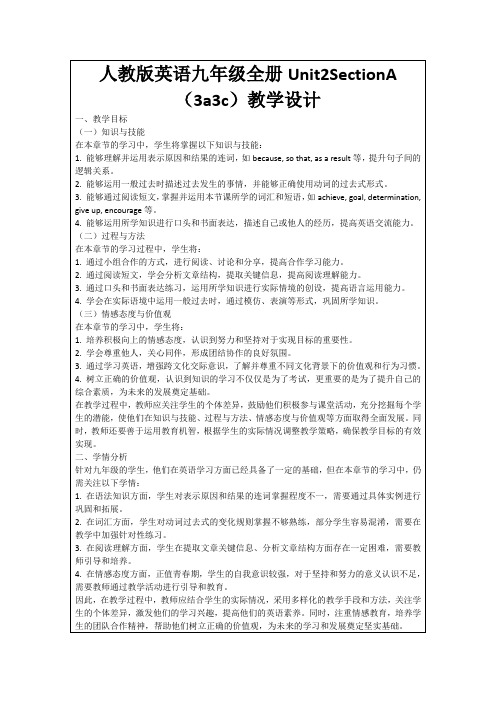
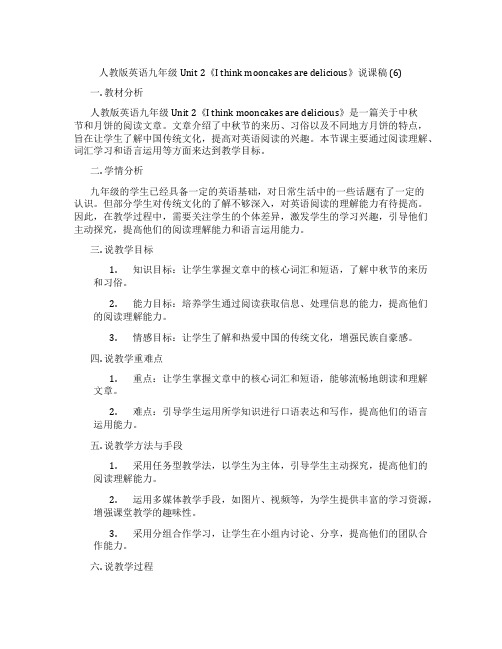
人教版英语九年级Unit 2《I think mooncakes are delicious》说课稿 (6)一. 教材分析人教版英语九年级Unit 2《I think mooncakes are delicious》是一篇关于中秋节和月饼的阅读文章。
文章介绍了中秋节的来历、习俗以及不同地方月饼的特点,旨在让学生了解中国传统文化,提高对英语阅读的兴趣。
本节课主要通过阅读理解、词汇学习和语言运用等方面来达到教学目标。
二. 学情分析九年级的学生已经具备一定的英语基础,对日常生活中的一些话题有了一定的认识。
但部分学生对传统文化的了解不够深入,对英语阅读的理解能力有待提高。
因此,在教学过程中,需要关注学生的个体差异,激发学生的学习兴趣,引导他们主动探究,提高他们的阅读理解能力和语言运用能力。
三. 说教学目标1.知识目标:让学生掌握文章中的核心词汇和短语,了解中秋节的来历和习俗。
2.能力目标:培养学生通过阅读获取信息、处理信息的能力,提高他们的阅读理解能力。
3.情感目标:让学生了解和热爱中国的传统文化,增强民族自豪感。
四. 说教学重难点1.重点:让学生掌握文章中的核心词汇和短语,能够流畅地朗读和理解文章。
2.难点:引导学生运用所学知识进行口语表达和写作,提高他们的语言运用能力。
五. 说教学方法与手段1.采用任务型教学法,以学生为主体,引导学生主动探究,提高他们的阅读理解能力。
2.运用多媒体教学手段,如图片、视频等,为学生提供丰富的学习资源,增强课堂教学的趣味性。
3.采用分组合作学习,让学生在小组内讨论、分享,提高他们的团队合作能力。
六. 说教学过程1.导入:通过展示中秋节的图片,引导学生谈论中秋节的习俗,激发学生的学习兴趣。
2.阅读理解:让学生阅读文章,回答相关问题,帮助他们理解文章内容。
3.词汇学习:引导学生学习文章中的核心词汇和短语,巩固所学知识。
4.口语表达:让学生运用所学知识,进行角色扮演,提高他们的口语表达能力。


人教版英语九年级Unit 2《I think mooncakes are delicious》第一课时说课稿一. 教材分析人教版英语九年级Unit 2《I think mooncakes are delicious》第一课时,主要围绕月饼这一传统节日食品展开。
通过描述不同人对月饼的看法,以及中秋节吃月饼的习俗,让学生在掌握相关词汇和句型的同时,了解我国传统文化。
本课时包含两个部分:part A和part B。
其中,part A为听力部分,通过听对话和短文,培养学生获取信息、处理信息的能力;part B为读写部分,通过阅读文章和进行相关写作活动,提高学生的阅读理解能力和写作技能。
二. 学情分析九年级的学生已经具备一定的英语基础,对于日常生活中的词汇和简单句型已能熟练运用。
但是,他们在阅读理解、写作和听力方面还存在一定的困难。
因此,在教学过程中,需要针对这些困难进行有针对性的指导,帮助学生提高英语应用能力。
三. 说教学目标1.知识目标:学生能够掌握与中秋节和月饼相关的词汇和句型,如mooncake, delicious, traditional, celebrate等。
2.能力目标:学生能够运用所学词汇和句型,进行简单的口语交流和写作。
3.情感目标:通过学习,学生能够了解中秋节吃月饼的习俗,增强对传统文化的认识。
四. 说教学重难点1.重点:中秋节和月饼的相关词汇和句型。
2.难点:如何运用所学词汇和句型进行口语交流和写作。
五. 说教学方法与手段1.交际法:通过模拟真实场景,让学生在实际语境中运用所学词汇和句型。
2.任务型教学法:通过完成各种任务,激发学生的学习兴趣,提高他们的实践能力。
3.多媒体教学:利用多媒体课件,直观展示中秋节和月饼的相关文化,增强学生的学习兴趣。
六. 说教学过程1.热身(5分钟):引导学生谈论中秋节的相关话题,如月亮、团圆等,激发学生的学习兴趣。
2.听力教学(10分钟):让学生听对话和短文,获取关于月饼的信息,并完成相关练习。

Unit2 Section B(1a-1d)教案【课题】Unit 2 I think that mooncakes are deliciousSection B 1a-1d 教师复备栏或学生笔记栏【学习目标】掌握本课生词掌握本课短语了解西方国家halloween的相关知识【学习重点难点】顺利完成听力练习1b 1c【学法指导】了解西方国家halloween背景---学习生词---听力训练—阅读听力材料—巩固练习【教学过程】一、导入(启发探究3分钟)万圣节由来关于万圣节由来的传说有许多版本,最普遍的认为,那是源于基督诞生前的古西欧国家,主要包括爱尔兰、苏格兰和威尔士,这几处的古西欧人叫德鲁伊特人。
德鲁伊特的新年在十一月一日,新年前夜,德鲁伊特人让年轻人集队,戴着各种怪异面具,拎着刻好的萝卜灯(南瓜灯系后期习俗,古西欧最早没有南瓜),他们游走于村落间。
这在当时实则为一种秋收的庆典;也有说是“鬼节”,传说当年死去的人,灵魂会在万圣节的前夜造访人世,据说人们应该让造访的鬼魂看到圆满的收成并对鬼魂呈现出丰盛的款待。
所有篝火及灯火,一来为了吓走鬼魂,同时也为鬼魂照亮路线,引导其回归。
这也就是为什么现在的万圣节里,还留有巫婆的扫帚、黑猫、咒语等痕迹。
二、自学(自主探究6分钟)拼读单词,记忆含义haunted a. 有鬼魂出没的;闹鬼的p.13ghost /g?ust/ n. 鬼;鬼魂p.13trick /trik/ n. 花招;把戏p.13treat /tri:t/ n. 款待;招待v. 招待;请客p.13【教学过程】spider /spaid?r)/ n. 蜘蛛p.13单词学习与运用1. haunted adj. 有鬼魂出没的,闹鬼的haunt v. (鬼)出没一个鬼屋 a haunted house2. trick n. 花招,把戏play a trick on sb = play tricks on sb.捉弄某人3. treat n. 款待,招待trick or treat 不请吃就捣蛋This is my treat.这次由我请客。

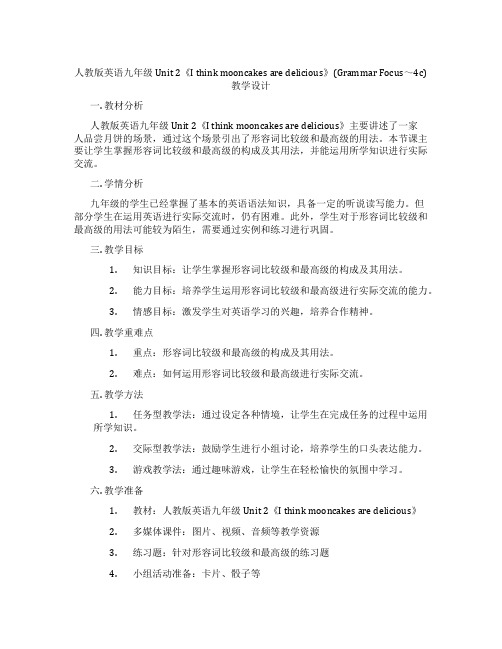
人教版英语九年级Unit 2《I think mooncakes are delicious》(Grammar Focus~4c)教学设计一. 教材分析人教版英语九年级Unit 2《I think mooncakes are delicious》主要讲述了一家人品尝月饼的场景,通过这个场景引出了形容词比较级和最高级的用法。
本节课主要让学生掌握形容词比较级和最高级的构成及其用法,并能运用所学知识进行实际交流。
二. 学情分析九年级的学生已经掌握了基本的英语语法知识,具备一定的听说读写能力。
但部分学生在运用英语进行实际交流时,仍有困难。
此外,学生对于形容词比较级和最高级的用法可能较为陌生,需要通过实例和练习进行巩固。
三. 教学目标1.知识目标:让学生掌握形容词比较级和最高级的构成及其用法。
2.能力目标:培养学生运用形容词比较级和最高级进行实际交流的能力。
3.情感目标:激发学生对英语学习的兴趣,培养合作精神。
四. 教学重难点1.重点:形容词比较级和最高级的构成及其用法。
2.难点:如何运用形容词比较级和最高级进行实际交流。
五. 教学方法1.任务型教学法:通过设定各种情境,让学生在完成任务的过程中运用所学知识。
2.交际型教学法:鼓励学生进行小组讨论,培养学生的口头表达能力。
3.游戏教学法:通过趣味游戏,让学生在轻松愉快的氛围中学习。
六. 教学准备1.教材:人教版英语九年级Unit 2《I think mooncakes are delicious》2.多媒体课件:图片、视频、音频等教学资源3.练习题:针对形容词比较级和最高级的练习题4.小组活动准备:卡片、骰子等七. 教学过程1.导入(5分钟)利用图片和提问方式引导学生谈论中秋节和月饼,激发学生的学习兴趣。
2.呈现(10分钟)通过多媒体课件展示形容词比较级和最高级的构成及其用法,让学生直观地了解两者之间的区别。
3.操练(15分钟)设计一系列练习题,让学生区分形容词比较级和最高级,并进行口头回答。

人教版英语九年级Unit 2《I think mooncakes are delicious》全单元教学设计一. 教材分析人教版英语九年级Unit 2《I think mooncakes are delicious》主要围绕着食物和节日展开,通过介绍中秋节和月饼这个话题,让学生们能够运用一般现在时谈论食物和节日的喜好。
本单元包括两篇课文,分别是Mooncakes 和 Western Food,以及相关的语法和写作部分。
二. 学情分析九年级的学生已经掌握了英语学习的基本语法和词汇,具备一定的听说读写能力。
他们对中秋节和月饼有一定的了解,但可能对一些西方节日和食物比较陌生。
因此,在教学过程中,需要注重激发学生的学习兴趣,并通过适当的引导和操练,帮助他们更好地理解和运用本课所学内容。
三. 教学目标1.能够听懂、说出一般现在时态的肯定句和否定句。
2.能够运用本课所学词汇和句型,谈论食物和节日的喜好。
3.能够理解并介绍中秋节和月饼的文化背景。
4.能够听懂、说出一般现在时态的疑问句。
5.能够通过阅读和写作,表达自己对食物和节日的看法。
四. 教学重难点1.一般现在时态的肯定句、否定句和疑问句的构成和运用。
2.单词和短语的准确理解和运用。
3.阅读理解和写作能力的培养。
五. 教学方法1.任务型教学法:通过设计各种任务,让学生在实践中运用所学知识。
2.情境教学法:创设各种情境,让学生在真实的语言环境中学习。
3.合作学习法:鼓励学生分组讨论和合作,提高他们的参与度和积极性。
六. 教学准备1.教材和教学参考书。
2.PPT或黑板,用于展示教学内容和板书。
3.教学音频和视频材料。
4.练习题和测试题。
5.相关的中秋节和月饼的文化资料。
七. 教学过程1.导入(5分钟)利用图片或实物展示中秋节和月饼,引导学生谈论他们对中秋节和月饼的了解和喜好。
2.呈现(10分钟)通过PPT或黑板,展示本课的关键词汇和句型,如“I think…”、“It’s delicious”等,同时进行翻译和解释。

人教版英语九年级Unit 2《I think mooncakes are delicious》教学设计 (6)一. 教材分析人教版英语九年级Unit 2《I think mooncakes are delicious》主要介绍中国传统节日中秋节以及与之相关的习俗,如赏月、吃月饼等。
本课通过讲述不同人物对月饼的看法,让学生学会用英语表达自己的观点和喜好。
教材内容丰富,插图生动,激发学生学习兴趣。
二. 学情分析九年级学生已具备一定的英语基础,能够运用英语进行简单的交流。
但部分学生对英语学习仍存在恐惧心理,课堂参与度不高。
此外,学生对中国传统节日的了解有限,需在教学中加以补充。
三. 教学目标1.知识目标:学生能够掌握关键词汇如mooncake, delicious, traditional,celebrate等;2.能力目标:学生能够用英语描述自己的喜好和观点;3.情感目标:培养学生对中国传统文化的兴趣,增强民族自豪感。
四. 教学重难点1.重点:关键词汇的掌握和运用;2.难点:如何表达自己的观点和喜好。
五. 教学方法1.情境教学法:通过设定中秋节的情境,让学生在实际语境中学习英语;2.任务型教学法:引导学生参与各种活动,提高课堂参与度;3.交际法:鼓励学生进行小组讨论,培养口语表达能力。
六. 教学准备1.准备相关图片、视频等教学资源;2.设计好课堂活动方案;3.准备月饼、水果等实物作为教学道具。
七. 教学过程1.导入(5分钟)利用图片和视频介绍中秋节,引导学生谈论与中秋节相关的习俗。
2.呈现(10分钟)展示月饼、水果等实物,引导学生用英语描述它们的外观和味道。
3.操练(10分钟)让学生进行小组讨论,分享自己最喜欢的月饼口味,并用英语表达原因。
4.巩固(10分钟)设计一个关于中秋节的食物喜好问卷调查,学生分组进行调查,并用英语记录结果。
5.拓展(10分钟)让学生用英语编写一段关于中秋节的小短文,可以包括习俗、美食、活动等。
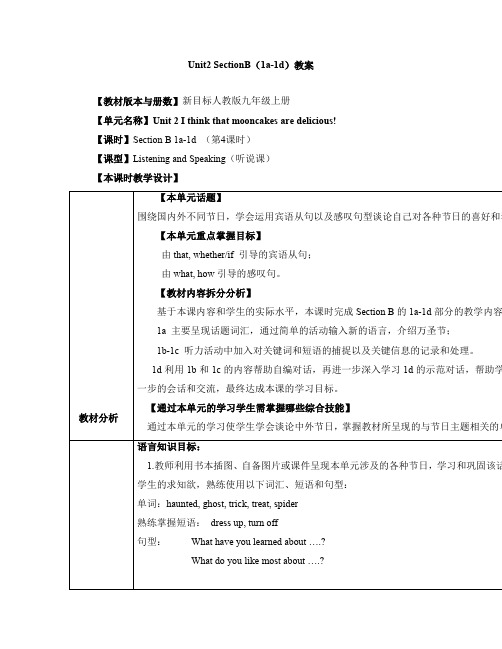
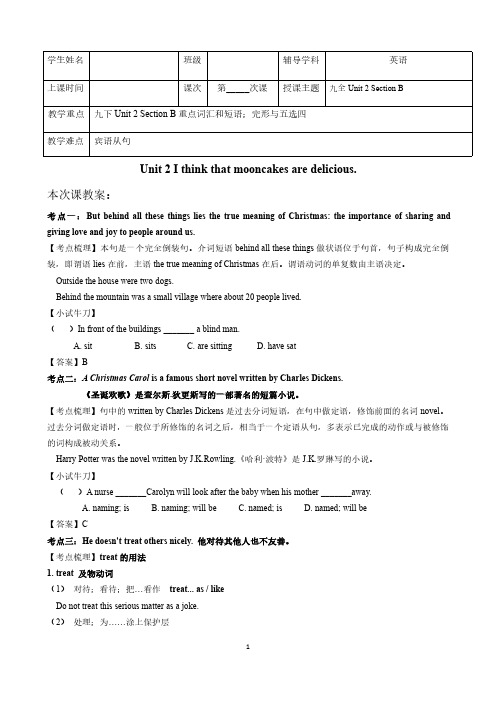
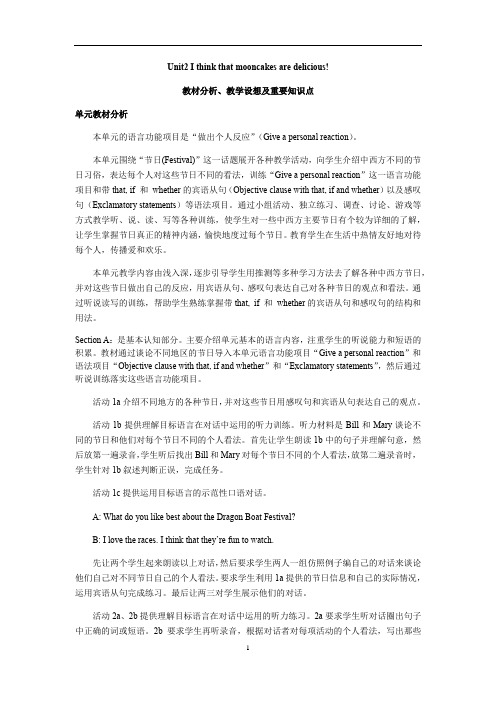
Unit2 I think that mooncakes are delicious!教材分析、教学设想及重要知识点单元教材分析本单元的语言功能项目是“做出个人反应”(Give a personal reaction)。
本单元围绕“节日(Festival)”这一话题展开各种教学活动,向学生介绍中西方不同的节日习俗,表达每个人对这些节日不同的看法,训练“Give a personal reaction”这一语言功能项目和带that, if 和whether的宾语从句(Objective clause with that, if and whether)以及感叹句(Exclamatory statements)等语法项目。
通过小组活动、独立练习、调查、讨论、游戏等方式教学听、说、读、写等各种训练,使学生对一些中西方主要节日有个较为详细的了解,让学生掌握节日真正的精神内涵,愉快地度过每个节日。
教育学生在生活中热情友好地对待每个人,传播爱和欢乐。
本单元教学内容由浅入深,逐步引导学生用推测等多种学习方法去了解各种中西方节日,并对这些节日做出自己的反应,用宾语从句、感叹句表达自己对各种节日的观点和看法。
通过听说读写的训练,帮助学生熟练掌握带that, if 和whether的宾语从句和感叹句的结构和用法。
Section A:是基本认知部分。
主要介绍单元基本的语言内容,注重学生的听说能力和短语的积累。
教材通过谈论不同地区的节日导入本单元语言功能项目“Give a personal reaction”和语法项目“Objective clause with that, if and whether”和“Exclamatory statements”,然后通过听说训练落实这些语言功能项目。
活动1a介绍不同地方的各种节日,并对这些节日用感叹句和宾语从句表达自己的观点。
活动1b提供理解目标语言在对话中运用的听力训练。
听力材料是Bill和Mary谈论不同的节日和他们对每个节日不同的个人看法。

精品基础教育教学资料,仅供参考,需要可下载使用!人教新目标版九年级全一册Unit 2 I think that mooncakes are delicious!Section A1.put on增加(体重);发胖eg:I can eat whatever I want because I never put on weight.穿上;上演eg:She put on her coat and went out.put短语put down 放下put off 推迟,延迟put up 张贴,搭建,举起put out扑灭put away放好,把……收起来2.pound(£)磅、英磅eg: The apples cost one dollar a pound.dollar($)yuan(¥)没有复数形式3.in two weeks两周后in +一段时间在……之后eg:She has gone to Beijing,and she will be back in two days.提问时用How soon4.similar相似的,类似的similar短语be similar to和……相似be similar in在……方面相似the same as与……相同5.whoever无论谁;不管什么人=anybody that引导名词性从句eg:Whoever visits the town will be welcome.eg:Give it to whoever you like.6.steal偷;窃取steal sth. from从……偷某物eg:He stole some money from his mother.have sth. stolen(让)某物被偷eg:She had her purse stolen. =Her purse was stolen.7.refuse拒绝refuse to do sth.拒绝做某事refuse sth.拒绝某事y放置;安放;产(卵);下(蛋)过去式过去分词均为laideg:Lay out the map on the table and let's have a look.eg:My hen laid an egg last night.lie躺下过去式:lay过去分词:lain说谎过去式:lied过去分词:lied9.admire观赏,欣赏eg:Do you admire this picture?admire...for...因……而钦佩/赞赏……eg:We admire Ann for her courage.10.share分享;共享;分摊eg:There is only one bedroom, so we’ll have to share.share sth. with sb和某人分享或合用某物eg:I really want to share my happiness with you.11.宾语从句(一)定义:由一个句子充当宾语,这个句子就叫宾语从句常见关系词有:that,if,whether,what,who,where,why和how that无词义在口语或非正式文体中常省略eg:He said (that) he could finish his work beforewhether,if意思是“是否”只能用whether,不能用if介词后面eg:I'm thinking of whether we should go to see the film.与or not连用eg:I can't say whether or not they can come on time.否定否定前置主句中的主语是第一人称代词I或we谓语动词是think,believe,expect,guess,suppose等eg:I don't think that Jack can finish his homework by himself.12.感叹句what引导What+a/an+形容词+单数名词(+主语+谓语)eg:What an interesting story (it is)!What+形容词+复数名词(+主语+谓语)eg:What beautiful flowers (they are)!What+形容词+不可数名词(+主语+谓语)eg:What delicious food (it is)!how引导How+形容词(+主语+谓语)eg:How kind (the girl is)!How+副词(+主语+谓语)eg:How well (she dances)!How+主语+谓语eg:How time flies!Section B1.dress up乔装打扮;装扮dress up like/as...打扮成……eg: Alina dressed up as/like a boy.2.treatn.款待;招待v.招待;请(客)治疗eg:Which doctors are treating her for her illness?treat...as...把……看作……treat sb.to sth请某人吃某物3.care about关心,在意eg:She doesn't care about her husband at all.辨析care about强调因责任感而关心;在乎eg:Your mother truly cares about you.care for照料;照顾=take care ofeg:He has to care for his sister at home.喜欢= be fond of多用于疑问句和否定句4.dead死的;失去生命的eg:That is a dead dog.辨析deadadj.强调“死”的状态作表语或定语可以和时间段边用diev.强调“死”的瞬间动作不能和时间段连用deathn.死;死亡dyingdie的现在分词adj.垂死、要死用作定语或表语5.business公事;商业;生意不可数名词短语on business出差do business做生意business hours办公时间;营业时间6.punish处罚;惩罚句型punish sb. for...因……而处罚某人punish sb. with/by...处某人以……7.warnn.警告;告诫eg:He warned her to keep silent.他告诫她保持沉默8.end up最终成为;最后处于eg: The party ends up with a poem.句型end up in...以某种结局结束eg: If you don't listen to me, you will end up in failure.end up doing sth.以做某事结束eg: At first they hated each other, but they ended up getting married.end up +adj.以……结束eg: If he goes on driving like this, he will end up dead.9.expect期待;预料句型expect to do sth.期待做某事expect sb. to do sth.期待某人做某事expect + that 从句eg: I expect that I'll be back next Monday.10.presentn.现在;礼物at presenteg:I don't have any dictionary at present.adj.现在的eg:He doesn't feel satisfied with his present job.11.spreadv.传播;展开eg:CCTV 1 spread the news as soon as the accident happened.n.蔓延;传播eg: The spread of the disease frightened the villagers.12.give out用尽;分发用完,耗尽发出( 光、热、烟、雾)=give off宾语是代词时,要置于give 与out之间eg:Give them out, please.宾语是名词时,可置于副词之前或之后eg: He is giving out the papers to his classmates.Section A1.put on增加(体重);发胖eg:I can eat whatever I want because I never put on weight.穿上;上演eg:She put on her coat and went out.put短语put down 放下put off 推迟,延迟put up 张贴,搭建,举起put out扑灭put away放好,把……收起来2.pound(£)磅、英磅eg: The apples cost one dollar a pound.dollar($)yuan(¥)没有复数形式3.in two weeks两周后in +一段时间在……之后eg:She has gone to Beijing,and she will be back in two days.提问时用How soon4.similar相似的,类似的similar短语be similar to和……相似be similar in在……方面相似the same as与……相同5.whoever无论谁;不管什么人=anybody that引导名词性从句eg:Whoever visits the town will be welcome.eg:Give it to whoever you like.6.steal偷;窃取steal sth. from从……偷某物eg:He stole some money from his mother.have sth. stolen(让)某物被偷eg:She had her purse stolen. =Her purse was stolen.7.refuse拒绝refuse to do sth.拒绝做某事refuse sth.拒绝某事y放置;安放;产(卵);下(蛋)过去式过去分词均为laideg:Lay out the map on the table and let's have a look.eg:My hen laid an egg last night.lie躺下过去式lay过去分词lain说谎过去式lied过去分词lied9.admire观赏,欣赏eg:Do you admire this picture?admire...for...因……而钦佩/赞赏……eg:We admire Ann for her courage.10.share分享;共享;分摊eg:There is only one bedroom, so we’ll have to share.share sth. with sb和某人分享或合用某物eg:I really want to share my happiness with you.11.宾语从句(一)定义:由一个句子充当宾语,这个句子就叫宾语从句常见关系词有:that,if,whether,what,who,where,why和how that无词义在口语或非正式文体中常省略eg:He said (that) he could finish his work beforewhether,if意思是“是否”只能用whether,不能用if介词后面eg:I'm thinking of whether we should go to see the film.与or not连用eg:I can't say whether or not they can come on time.否定否定前置主句中的主语是第一人称代词I或we谓语动词是think,believe,expect,guess,suppose等eg:I don't think that Jack can finish his homework by himself.12.感叹句what引导What+a/an+形容词+单数名词(+主语+谓语)eg:What an interesting story (it is)!What+形容词+复数名词(+主语+谓语)eg:What beautiful flowers (they are)!What+形容词+不可数名词(+主语+谓语)eg:What delicious food (it is)!how引导How+形容词(+主语+谓语)eg:How kind (the girl is)!How+副词(+主语+谓语)eg:How well (she dances)!How+主语+谓语eg:How time flies!Section B1.dress up乔装打扮;装扮dress up like/as...打扮成……eg: Alina dressed up as/like a boy.XX学校用心用情服务教育!2.treatn.款待;招待v.招待;请(客)治疗eg:Which doctors are treating her for her illness?treat...as...把……看作……treat sb.to sth请某人吃某物3.care about关心,在意eg:She doesn't care about her husband at all.辨析care about强调因责任感而关心;在乎eg:Your mother truly cares about you.care for照料;照顾=take care ofeg:He has to care for his sister at home.喜欢= be fond of多用于疑问句和否定句4.dead死的;失去生命的eg:That is a dead dog.辨析deadadj.强调“死”的状态作表语或定语可以和时间段边用diev.XX学校用心用情服务教育!强调“死”的瞬间动作不能和时间段连用deathn.死;死亡dyingdie的现在分词adj.垂死、要死用作定语或表语5.business公事;商业;生意不可数名词短语on business出差do business做生意business hours办公时间;营业时间6.punish处罚;惩罚句型punish sb. for...因……而处罚某人punish sb. with/by...处某人以……7.warnn.警告;告诫eg:He warned her to keep silent.他告诫她保持沉默8.end up最终成为;最后处于eg: The party ends up with a poem.句型end up in...以某种结局结束eg: If you don't listen to me, you will end up in failure.end up doing sth.以做某事结束eg: At first they hated each other, but they ended up getting married.end up +adj.以……结束eg: If he goes on driving like this, he will end up dead.9.expect期待;预料句型expect to do sth.期待做某事expect sb. to do sth.期待某人做某事expect + that 从句eg: I expect that I'll be back next Monday.10.presentn.现在;礼物at presenteg:I don't have any dictionary at present.adj.现在的eg:He doesn't feel satisfied with his present job.11.spreadv.传播;展开eg:CCTV 1 spread the news as soon as the accident happened.n.蔓延;传播eg: The spread of the disease frightened the villagers.12.give out用尽;分发用完,耗尽发出( 光、热、烟、雾)=give off宾语是代词时,要置于give 与out之间eg:Give them out, please.宾语是名词时,可置于副词之前或之后eg: He is giving out the papers to his classmates.。
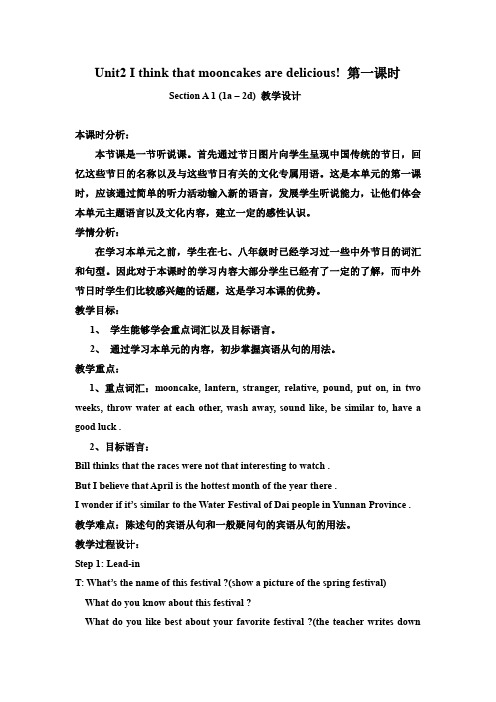
Unit2 I think that mooncakes are delicious! 第一课时Section A 1 (1a – 2d) 教学设计本课时分析:本节课是一节听说课。
首先通过节日图片向学生呈现中国传统的节日,回忆这些节日的名称以及与这些节日有关的文化专属用语。
这是本单元的第一课时,应该通过简单的听力活动输入新的语言,发展学生听说能力,让他们体会本单元主题语言以及文化内容,建立一定的感性认识。
学情分析:在学习本单元之前,学生在七、八年级时已经学习过一些中外节日的词汇和句型。
因此对于本课时的学习内容大部分学生已经有了一定的了解,而中外节日时学生们比较感兴趣的话题,这是学习本课的优势。
教学目标:1、学生能够学会重点词汇以及目标语言。
2、通过学习本单元的内容,初步掌握宾语从句的用法。
教学重点:1、重点词汇:mooncake, lantern, stranger, relative, pound, put on, in two weeks, throw water at each other, wash away, sound like, be similar to, have a good luck .2、目标语言:Bill thinks that the races were not that interesting to watch .But I believe that April is the hottest month of the year there .I wonder if it’s similar to the Water Festival of Dai people in Yunnan Province . 教学难点:陈述句的宾语从句和一般疑问句的宾语从句的用法。
教学过程设计:Step 1: Lead-inT: What’s the name of this festival ?(show a picture of the spring festival)What do you know about this festival ?What do you like best about your favorite festival ?(the teacher writes downsome useful expressions on the blackboard )Step 2: Presentation .Ask students to read the names of the festival in 1a .and teacher help them say as many as possible .1 .1a Look at the pictures and guess what festivals they are. Match the pictures with the descriptions.1. ___ The Water Festival in Thailand2. ___ The Dragon Boat Festival in Hong Kong3. ___ The Chinese Spring Festival in Beijing4. ___ The Lantern Festival in JiangxiStep 3 Listening1b Listen and tell true or false.(Ask students to read the four sentences and think about which they talk about .)1. Bill thinks that the races were not that interesting to watch. T F2. Mary thinks that the teams were fantastic. T F3. Bill wonders whether they’ll have zongzi again next year. T F4. Bil l and Mary believe that they’ll be back next year to watch the races. T F Step 4 Speaking1c Talk about the pictures in 1a.Make conversations.ExamplesA: What do you like best about the Dragon Boat Festival?B: I love the races. I think they’re fun to watch.Step 5 Pair WorkA: What do you like best about the …?B: I love the____________,I think that they’re________________________ . Step 6 Listening2a Listen to the conversation between Wu Ming and Harry and circle the correct words in sentences.1. Wu Ming and Harry are cousins/ strangers / friends.2. Wu Ming went to Singapore/ Hong Kong / Macao for his vacation.3. Wu Ming visited his relatives / friends / classmates.4. Wu Ming liked eating out / shopping / the Dragon Boat Festival best.2b Wu Ming did a lot of fun activities, but there were also downsides. Listen again and fill in the chart.Step 7 Speaking2c Role-play the conversations between Wu Ming and Harry.A: What did you do on your vacation?B: I visited my cousins. I think that we ate five meals a day! I’ve put on five pounds.A: I guess the food was delicious, right?Step 8 Role –play1、Watch the video and learn Water Festival.Read the conversation and tell “True”or “False”.(1). Ben is going to Chiang Mai in two weeks. ( )(2). Clara believes that April is the hottest month of the year there. ( ) (3). The Water Festival in Thailand is from April 13th to 15th. ( )(4). The Thai new year is a time for cleaning and washing bad things. ( ) 2、Role –play the conversationStep 8 Language points and summary短语:Ask students to find out the main points and the phrases that they can’t understand .write them on the blackboard and discuss with parterners .1、the Water Festival,2、the Dragon Boat Festival,3、Chinese Spring Festival,4、the Lantern Festival,5、watch the races,6、a little,7、like…best,8、go…for one’s vacation,9、enjoy doing sth., 10、eat out, 11、five meals a day, 12、put on,13、in two weeks, 14、sound like, 15、from…to…, 16、be similar to, 17、throw … at …, 18、wash away, 19、have good luck, 20、in the new year句子:Bill thinks that the races were not that interesting to watch.Bill wonders whether they’ll have the sweet rice dumplings again next year. What do you like best about the Dragon Boat Festival?What did you do on your vacation?But I believe that April is the hottest month of the year there.I wonder if it’s similar to the water festival of Dai people in Yunnan Province. Step 9 Homework.1. Learn the new words and expressions by heart.2. Copy the sentences with the Objective Clause and learn them by heart.。

人教版英语九年级Unit 2《I think mooncakes are delicious》说课稿(带答案)一. 教材分析人教版英语九年级Unit 2《I think mooncakes are delicious》主要介绍了中秋节的食物——月饼,并通过介绍食物来学习一般现在时的运用。
本节课的主要内容包括一般现在时的结构、动词的变化以及如何用一般现在时表达喜好。
教材内容丰富,贴近学生生活,能够激发学生的学习兴趣。
二. 学情分析九年级的学生已经掌握了基本的英语语法知识,对一般现在时也有了一定的了解。
但是,学生在运用一般现在时表达喜好方面还存在一定的困难。
因此,在教学过程中,需要帮助学生巩固一般现在时的语法知识,并指导学生如何用一般现在时表达喜好。
三. 说教学目标1.知识目标:学生能够掌握一般现在时的结构,正确运用一般现在时表达喜好。
2.能力目标:学生能够在真实情境中运用一般现在时进行交流。
3.情感目标:通过本节课的学习,学生能够增强对中华文化的认同感,提高对英语学习的兴趣。
四. 说教学重难点1.教学重点:一般现在时的结构,动词的变化。
2.教学难点:如何用一般现在时表达喜好。
五. 说教学方法与手段1.教学方法:采用任务型教学法,情境教学法,合作学习法。
2.教学手段:利用多媒体课件,图片,卡片等辅助教学。
六. 说教学过程1.导入:通过展示中秋节的相关图片,引导学生谈论中秋节的食物,激发学生的学习兴趣。
2.新课呈现:介绍一般现在时的结构,动词的变化,并通过示例让学生练习运用一般现在时表达喜好。
3.课堂活动:设计一系列关于食物的任务,让学生在完成任务的过程中运用一般现在时进行交流。
4.巩固练习:通过小组活动,让学生互相提问并回答关于喜好的问题,进一步巩固所学知识。
5.课堂小结:总结本节课所学内容,强调一般现在时的运用。
6.作业布置:让学生课后家人或朋友的一日三餐,并用一般现在时进行描述。
七. 说板书设计板书设计如下:人教版英语九年级Unit 2《I think mooncakes are delicious》一般现在时:结构:主语 + 动词原形 / 动词三单用法:描述经常发生的动作或存在的状态规则动词:一般在词尾加-s或-es不规则动词:需单独记忆I like / love / enjoy + 名词 / 动名词.八. 说教学评价1.课堂参与度:观察学生在课堂上的参与情况,是否积极发言,参与小组活动等。

Unit 1How can we become good learners?Section A (1a-2d)1.重点单词:textbook,conversation,aloud,pronunciation,sentence 2.重点短语:make word cards,work with friends,ask the teacher for help,listen to tapes,speaking skills,word by word,be patient 3.重点句式:How can we become good learners?—How do you study for a test?—I study by working with a group.What about reading aloud to practice pronunciation?It's too hard to understand spoken English.—Have you ever studied with a group?—Yes,I have.I've learned a lot that way.Try to guess a word's meaning by reading the sentences before and after it.You can become better by reading something you enjoy every day.The more you read,the faster you'll be.1.重点短语和句型2.How对方式进行提问及用by+doing回答How对方式进行提问及用by+doing 回答一、预习课本P1-2新单词并背诵,完成下面的汉译英。
1.课本____________ 2.交谈____________3.大声地____________ 4.发音(n.)____________5.句子____________ 6.有耐心的____________二、认真预习1a-2d找出下列短语和句型。
Unit 2 I think that mooncakes are delicious! Language points and summary1. stranger n. 陌生人(可数名词)strange adj. 陌生的,奇怪的e.g. Don’t talk to strangers. 不要和陌生人说话。
There is nothing strange in the room. 房间里没有奇怪的东西。
2. relative n. 亲属,亲戚(可数名词)e.g. They have a lot of relatives. 他们有许多亲戚。
3. put on 增加(体重);发胖;穿上e.g. They’ve put on five pounds. 他们体重增加了5磅。
It’s cold outside. Please put on your coat. 外面冷,请穿上大衣。
4. pound n. 磅;英镑(可数名词)e.g. The desk weighs 5 pounds. 这张课桌重5磅。
5. People go on the streets to throw water at each other.throw at 抛向;泼向;洒向动词throw后接所投掷的物体,用介词at引入泼洒的对象。
e.g. On our way here, someone threw a stone at our car, but fortunately we were nothit.在我们来的路上,有人向我们的车投掷石块,所幸的是我们没被砸中。
It’s the first snow of the year, and the children are happily throwing snowballs at each other.这是今年的第一场雪,孩子们高兴地拿雪球相互抛着。
1. Chinese people have been celebrating Middle-Autumn Festival and enjoyingmooncakes for centuries.for centuries 几百年2. They carry people’s wishes to the families they love and miss.它们把人们的祝愿带给他们热爱和想念的家人。
they love and miss是定语从句,修饰the families。
3. However, most people think that the story of Chang’e is the most touching.(1) the story of Chang’e is the most touchi ng是宾语从句,关联词是that。
(2) 第一个most是“大多数”之意,第二个most在touching前面构成最高级。
4. Whoever drank this could live forever.无论谁喝了这个都会长生不老。
whoever意为“无论谁,不管什么人”。
类似的词有:whatever意为“无论什么”,whenever意为“无论何时”,wherever意为“无论在哪里”,however意为“无论怎样”。
它们等同于“no matter + wh⁃”结构。
Whoever drank this是主语从句,在句中作主语。
5. Hou Yi was so sad that he called out her name to the moon every night.后羿那么伤心以至于他每天晚上对着月亮大喊她的名字。
1) so …that …“如此……以至于……”,so是副词,其后跟形容词或副词,that后跟句子。
如:He was so happy that he jumped up.他那么高兴以至于跳了起来。
2) call out … to… 对着……大喊……6. He quickly laid out her favourite fruits and desserts in the garden.Lay的用法:lay out 铺开,摆开e.g. He laid the map out on the table.7. How he wished that Chang’e could come back!他多么希望嫦娥能回来呀!这是一个感叹句,其中Chang’e could come back是宾语从句。
1. It is also a good idea to help parents to do something instead.It是形式主语,to help parents to do something 是真正主语。
类似句型有:It is + n. + to do sth.It is + adj. (for sb.) to do sth.It takes (sb.) sometime + to do sth.e.g. It is not a good habit to get up late. 赖床不是一个好习惯。
It is very important for young people to learn English well.对于年轻人来说,学好英语是很重要的。
It took the workers almost two years to finish the building.工人们花了几乎三年的时间完成这一建筑。
2. One is Mother’s Day on the second Sunday of May, and the other is Father’s Day…辨析another, the other, others & the othersanother和the other都有“另一个”的意思。
another指多个中的“另一个”;the other 则指两个中的“另一个”,常与one构成固定one ... the other ...,“一个……另一个……”。
e.g. The shoes don’t fit me. Would you please show me another pair?鞋不适合我,你能给我看看另外一双吗?My sister has two skirts. One is yellow, the other is black.我姐姐有两条裙子。
一条是黄色的,另外一条是黑色的。
others (=other+复数名词)与the others (=the other+复数名词)均含有“其他一些”的意思。
others泛指多部分中的一部分,可与some构成固定结构some ... others ...,“一些……一些……”;the others则特指剩余的一部分。
e.g. Some like fruit and vegetables, others like junk food.一些人喜欢吃水果和蔬菜,还有一些人喜欢吃垃圾食品。
Two of you can go to the lab with me, and the others will have to stay in theclassroom.你们当中的两人可以跟我去实验室,剩下的人将呆在教室。
1. But behind all these things lies the true meaning of Christmas…lie v. (lay, lain) 存在; 平躺; 处于注意与lay的区别:lay v. (laid, laid)下蛋; 产卵2. He warns Scrooge to change his ways if he doesn’t want to end up like him.War n v. 警告; 告诫常用于以下固定短语: warn sb. (not) to do sth. 表示“警告某人(不要)干某事”;warn sb. of/about sth. 表示“提醒/ 警告某人注意某事”。
如:The police warned us not to go out at night.They warned him of the danger.She warned her son about the fire.end up 最终成为; 最后处于3. The Spirit of Christmas 圣诞精神(圣诞节的意义)He also tells Scrooge to expect three spirits to visit him.他还告诉斯克鲁奇准备好等待三个幽灵的造访。
第一个短语中spirit指与肉体相对而言的“精神; 心灵”解; 第二个句子中spirit是“灵魂; 鬼怪; 幽灵”之意。
试比较:I shall be with you in spirit.我在精神上也你们同在。
In the story, it is said that the area is haunted by evil spirits.在故事里, 据说那片地区闹鬼。
4. He is mean and only thinks about himself.mean在句中作形容词, 意思是“吝啬的; 小气的; 自私的”。
如:Mr. Smith is a mean old man.史密斯先生是一个小气的老头。
He was mean to those who worked for him.他对那些为他工作的人刻薄小气。
Some people around us are mean with money.我们周围有些人在金钱方面十分吝啬。
5. He now treats everyone with kindness and warmth, spreading love and joy everywhere he goes.他现在用善良和温暖对待任何人, 到处传播爱与快乐。
spread v. (spread, spread) 传播; 展开n. 蔓延; 传播Not only do people spread them around in different hiding places for an egghunt, but they also give out these treats as gifts.句中的not only ... but (also) ... 意为“不但……而且……”。
当not only位于句首时,其后的主谓要部分倒装。
此外,当not only ... but (also) ... 连接两个代词或名词作主语时,谓语动词要与but (also)后的代词或名词在数上保持一致。